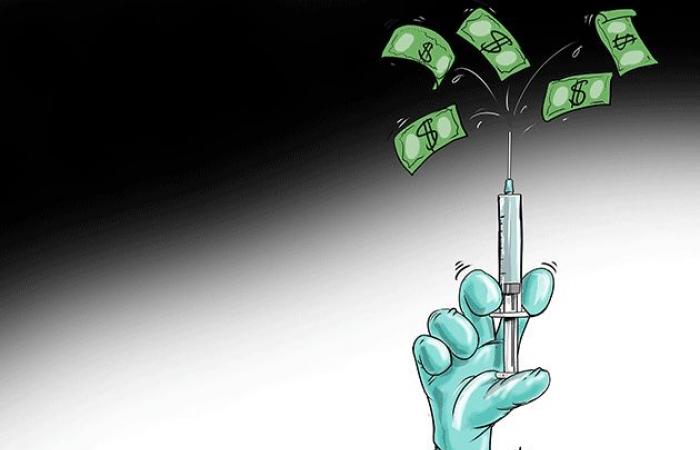It is imperative to know that only doctors are authorized to inject hyaluronic acid or botox and to practice aesthetic medicine procedures. Moreover, these practices, which are increasing in beauty salons, among hairdressers or even in certain Spas, constitute the illegal practice of medicine and are contrary to the morals of the population.
File created by Sofia Ouahib
Take advantage of an exceptional offer for the New Year”, “Crazy discounts await you at the start of the year”, “Only one week left to take advantage of our offer. Take the opportunity to start the year in style”… So many offers flooding social networks at the start of the year. But while we might think that these are offers for clothes or home furnishings, that is not the case. These are actually discount advertisements for all kinds of aesthetic medicine injections. The irony is that these services are not offered by doctors but by so-called “professional” beauticians.
And many women succumb to these “tempting” offers, without taking into account the repercussions on their health, which, for some, have been dramatic. This is the case of a patient who had to be urgently hospitalized due to a serious infection due to an injection made by a beautician “injection specialist” of hyaluronic acid into the buttocks. Another even had to postpone her wedding by a year because of botched injections given in a hair salon.
To this end, a medical assistant says: “The future bride in question decided, two weeks before her wedding, to have her lips injected. Not having the means to see a doctor, she searches on Instagram and comes across a promotional offer offered by a beauty institute. She takes the plunge. Once the injection is done, the bride-to-be’s lips swell a lot. But the beautician reassures her and guarantees that by the next day, it will deflate. As soon as she arrived home, the young girl noticed that the product had migrated! A disaster,” continues the medical assistant. The next day, the patient went around to doctors to remove the product but none would take her.
And for good reason: doctors do not want to take responsibility for an act that they did not carry out. She then returned to the beautician where she had her injections. And the latter injected him with hyaluronidase, which is even more dramatic.
The reason: this enzyme, very useful after a failed injection, allows hyaluronic acid to dissolve, can cause, if the injections are carried out by unauthorized personnel, serious complications and in particular thrombosis of a vessel, necrosis or significant inflammation of the tissues. The medical assistant, who admits to having seen all the colors when it comes to missed injections, remembers another case, that of a patient who called the medical office, desperate to speak to the doctor.
The assistant asks her what service she wants to perform. The patient does not respond. “I feel uncomfortable. I explain to him that I must have this detail so that I can give him the slot that would suit the desired service,” explains the medical assistant. The patient ends up admitting to him that she had her lips injected by a beautician, that they tripled in volume and that she is now trying to make them deflate. “I then explain to him that it is the responsibility of the beautician; and that the doctor cannot touch her and take on this responsibility.”
The patient then confides to him that the beautician blocked her number. Unfortunately, these cases are not isolated. Specialist doctors continue to warn women about the illegal practice of aesthetic medicine. Indeed, so-called “professional” beauticians offer hyaluronic acid filler and botox injections. And it is on social networks that they promote themselves. Their strategy is simple: publish advantageous photos with, in the caption, tempting offers to attract the most customers. However, they have no right to carry out this type of act reserved for doctors only.
Skin necrosis
Indeed, it is imperative to know that only doctors are authorized to inject hyaluronic acid or botox and to perform aesthetic medicine procedures. Moreover, these practices, which are increasing in beauty salons, among hairdressers or even in certain Spas, are, according to Professor Mustapha Khiati, the illegal practice of medicine and are contrary to the morals of the population. “There is clearly a lack of control over these practices and the victims do not dare to file a complaint,” he laments.
“You should know that the products used such as botulinum toxin (botox) or hyaluronic acid are brought back in shopping bags through well-established circuits,” says Professor Khiati. And the use of botox (botulinum toxin) or hyaluronic acid injections using poorly sterilized syringes can lead to infections, necrosis, or even more serious accidents, such as the amputation of a piece of lip or nose. . Botox can also, according to him, give a frozen face that is unable to smile or have an expressive facial expression. “With hyaluronic acid, edema, small bleeding or hematomas may appear.
It is mainly nodules in the form of a small ball at the level of the injected area which appear and are likely to persist,” he adds. And in the event of a bad injection, such as an injection into an artery and the mouth, Professor Khiati indicates that skin necrosis can occur or cause vascular emboli.
The quality of the product chosen and injected under the skin can also, according to Mr. Khiati, be responsible for serious consequences on the skin going as far as lipoatrophy or necrosis which results in the appearance of an area of blackened skin at distance from the injection. Plastic surgery is therefore not without risks.
For Professor Khiati, even in expert hands, accidents can happen. “The surgeon has a duty to inform his patient of the possible risks of his action,” he continues.
Knowing that any surgical act involves risks and limits, and that in surgery, there is no zero risk. When it concerns the face, Professor Khiati assures that plastic surgery, particularly by injections, exposes one to four classic risks, namely hemorrhage (or hematoma), infection, scars and facial paralysis.
For example, scars can persist without any possibility of making them disappear. “Sometimes, they become hypertrophic or even keloid requiring special treatment,” he warns. More serious is the occurrence of skin necrosis, that is to say the death of a more or less large area of the skin giving the opposite result to that expected. Loss of skin sensitivity may also occur.
Moreover, Mr. Khiati assured that all procedures performed on the face can greatly affect the quality of the skin. “Eyelid surgery or lipofilling (fat injection) can also lead to serious consequences, namely infections, disunity of scars, pain, keloids, necrosis, sensitivity disorders, fat embolism, etc.
Certain specific interventions such as depigmentation of the iris, which can impair vision,” he adds. Pointing out in passing that much more painful interventions are beginning to experience particular popularity, such as increasing buttock volume. Moreover, the British newspaper the Guardian published, in 2021, a study on the adverse effects caused by anti-aging treatment which would affect one in six people in Europe, or 16% of beneficiaries of this treatment.
The most common complications observed are: muscle stiffness, dizziness, vertigo, pain, sometimes even cardiovascular signs, namely high blood pressure, myocardial infarction (heart attack).
In addition, Mr. Khiati assures that in the case of facial injections, complications have been reported such as edema, blue dots at the injection site, drooping of an upper eyelid whose remission can take several months, diplopia (double vision). “The same goes for cosmetic dental care such as whitening or veneers which must be done by professionals,” concludes the specialist.






